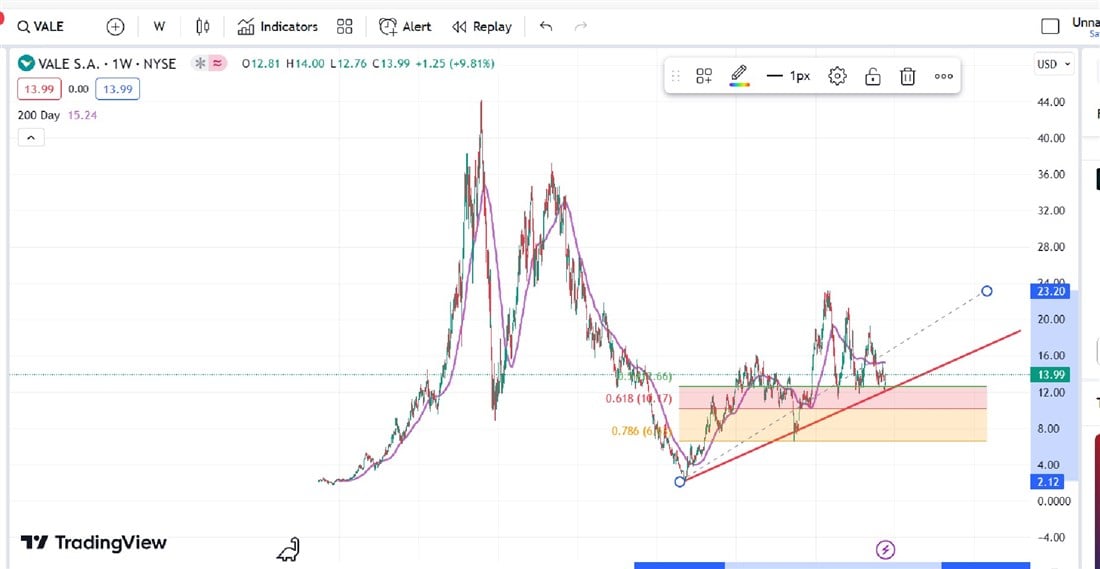
If you - like the rest of the market - were betting on the United States FED cutting interest rates this year, then a rude awakening was the catch of the day at the last FOMC meeting, where chairman Jerome Powell indicated that there could be further hikes for the rest of 2023.
This reality has set across most American equities, as seen in the current volatility measures. A VIX (also called the 'fear' index), a proxy for volatility, has declined from the low thirties at the beginning of the year to its current level below fifteen.
As far as American stocks go, very little - if any - movements are expected to occur. Investors can expand their horizons to other markets where macroeconomic forces are lining up stocks for a big swing; here are some of the apparent standouts to consider.
Alibaba Group
In the heart of Asia's powerhouse, Alibaba Group (NYSE: BABA) has a front-row seat to the latest economic stimulus the Chinese government sets. Every week or two, the government seems to develop new measures to revive its lackluster economy, which has suffered from low to negative interest rates.
Despite China's economy posting negative inflation in its latest release, signaling a severe contraction from the consumer side of things, Alibaba's NYSE: BABA" target="_blank" rel="noopener">latest quarter acts as a significant outlier.
As a consumer goods and E-commerce digital platform, Alibaba was one of the first to get bashed during the disappointing Chinese economic reports. However, a resilient business model alongside superior profitability comes to prove why this may be the strongest buy in the region.
Alibaba analyst ratings suggest that this stock should be trading at a consensus price closer to $138.64, significantly higher than today's compressed valuations. Closing this gap would imply a net upside of 46%.
Many investors believe China is 'uninvestable,' arguing that they prefer investing in an American counterpart such as Amazon.com (NASDAQ: AMZN). While some may be right about Amazon's upside today, here are a few things that they should consider.
Amazon's net income margins stand at a five-year average of 4.1% according to its financials; on the other hand, Alibaba's have been at 21.3%. This wide gap in profitability will eventually drive earnings per share growth and boost shareholder perks like stock buyback programs.
This perception is considered within Amazon's price targets, which only reflect a 16.5% upside. Once economic stimulus measures trickle down to the Chinese consumer, this name will leave the sector average in the dust; the question is: Is it too 'uninvestable' still?
Vale
Vale (NYSE: VALE) is not only technically attractive but is also grabbing attention from analysts at banks like J.P. Morgan Chase & Co. (NYSE: JPM) as the bank has just upgraded the stock.
As the price of iron ore, Vale's strong suit product, rose roughly 14% from August to today, much scuttlebutt in the metals industry is building significant bullish momentum.
The queue of stocks waiting on China's economic rebound adds another behind Alibaba. Vale's executive team remains "optimistic" about the future demand from the world's largest iron ore importer.
The Chinese market stemming from the need to support infrastructure investments and construction can be one reason analysts love this stock. There is a consensus price target of $16.82 a share, which points to a 20.2% upside from today's levels.
The big guns have already placed their bets as well, now, Lazard (NYSE: LAZ) has upped its investment in Vale by as much as 52.3% during the past quarter. Should investors be betting alongside the Titans?

Looking at Vale's stock chart, investors can see why today's prices represent a robust opportunity. Entering into the Fibonacci golden retracement of 61.8%, which also acts as a triple-bottom pattern, is enough to bring Lazard's new position into profit; you could also join this party.
Telekomunikasi Indonesia
Suppose science could backtrack humanity's history enough to create the big bang theory. In that case, investors can backtrack the industries that tend to jump once a country becomes wealthy. In the case of Telekomunikasi Indonesia (NYSE: TLK), the telecom sector in Indonesia shows it could be a significant boom.
GDP per capita in Indonesia has grown from roughly $3,000 to approximately $12,000 today. As citizens in this region become wealthier, one of the first things that gets an upgrade is a phone and other digital devices that place increasing weight on the need to develop communications infrastructure.
Considering that Indonesia's GDP is driven by the services industry (at 45.4%), companies like Telekomunikasi are set to reap the rewards of a growing nation. Markets are hopping on this trend ahead of time as well.
BlackRock (NYSE: BLK), the world's largest asset manager, has increased its position in Telekomunikasi stock by 4.7% during the last quarter to own 0.11% of its stock. Further, this is one stock with a brighter expected future relative to its American counterparts.
Using the forward price-to-earnings ratio, investors can see where markets value the next twelve months of earnings for an individual stock.
In the case of Telekomunikasi, a 13.8x forward P/E will make this company's expected earnings more valuable than rivals like AT&T (NYSE: T) and Verizon Communications (NYSE: VZ), which trade at 5.9x and 7.4x multiples respectively to reflect their high and stable dividends at the expense of potential growth.






